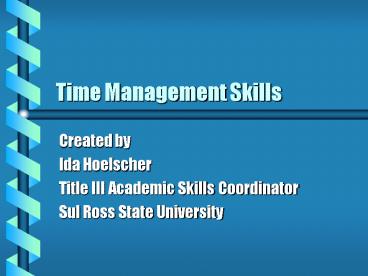Time Management Skills PowerPoint PPT Presentation
1 / 21
Title: Time Management Skills
1
Time Management Skills
- Created by
- Ida Hoelscher
- Title III Academic Skills Coordinator
- Sul Ross State University
2
Is Time Management Important?
- Yes!!!
- You dont want to feel like youre walking a
tightrope. - You never had to worry about it before!
- Before you had study hall or your parents saying
do your homework first.
3
College versus High School
- In High School, you went to class from early in
the morning till mid-afternoon. - In college you go the hours you want.
- In High School you had time in class to complete
projects. - In College you do most of your work out of class.
4
Responsibility
- Now, as youre probably figuring out, you have
to decide when to go to school, when to study,
when to go to work, and when to have fun. - If you do a poor job you can often feel like this
guy! - If you do a good job you will find you have time
for all these things and feel good about yourself
too!
5
First, What do you do now?
- For a week keep track of what you do now
- when you sleep,
- when you eat,
- when you work,
- when you go to class,
- when you study,
- when you have fun,
- and anything else.
6
Evaluate Decide on Change
- Figure out how much time each week you spend on
each task . - Are you spending it where you need to?
- What do you need to spend more time on?
- What do you need to spend less time on?
7
Time you cant change
- 56 hours for sleep,
- 8 hours are usually adequate.
- 21 hours to eat,
- Dont try to rush your eating or skip meals.
- 20 hours for classes and labs,
- Dont try to skip one class to get work done in
another.
8
Other committed time
- Next, fill in other fixed commitments .
- Work - unless hours vary from week to week.
- Meeting times, or practice times of clubs,
organizations, or sports. - Social time that doesnt change.
- Time where you sleep in on Saturday or Sunday
mornings.
9
Principles of Time Use
- Plan your day at the same time each day.
- Allow more time for learning new material,
drafting a paper, grasping concepts, etc. - As you begin work on each part , jot down the
time you expect to finish give yourself a
mini-reward when you finish on time. - Review for only 15 to 45 minutes ,
- especially before and after class.
10
Principles - cont.
- Do something daily - dont procrastinate.
- Schedule harder study tasks when you are most
alert. - Plan to learn the first time so the other times
you are just reviewing , making up test
questions, etc. - Dont try to allocate ALL your time just make
sure you schedule what you have to get done.
11
When to study.
- Plan to study two hours for every hour you spend
in class. - Study your difficult subjects first.
- Avoid marathon study sessions.
- Study during the time you are most alert each day.
12
Where to study.
- Find a regular study place
- It should be somewhere that you dont eat or
sleep. - Train your body that you study there.
- Dont get too comfortable.
- Dont study on the bed.
- Easy chairs sofas are unsafe too.
- Use a library.
13
Handling the Rest of the World
- Pay attention to your mind wandering.
- Set rules times with roommates, spouses,
kids. - Avoid noise distractions.
- Talk to people who routinely interrupt.
- Avoid the phone!
- Learn to say NO!
- Hang a do not disturb sign.
14
3 Rules of Time Management
- Dont create impossible situations.
- Define priorities.
- Avoid distractions and lack of focus.
15
Dont Create Impossible Situations
- Dont try to do too much
- work full time,
- school full time,
- too many lab classes,
- single parent,
- or too many extracurriculars.
- Plan to study 2 hours for every 1 hour of class.
- Decide which class you have to finish.
16
Define Priorities
- Create lists to set priorities
- Weekly Calendar - this is your basic time
budgeting guide - list courses, work , study
time, meals, recreation. - Daily Calendar - this is what you want to do
today - homework, tests, housework, shopping,
recreation. - Goal List - this is a list of things you have to
do - list commitments, goals, etc.
17
Avoid Distractions Lack of Focus
- Procrastination!
- Crisis management.
- Switching and floundering.
- Television, telephone
- Friends
- Emotional blocks
- Sickness
18
Good Time Management Strategies
- Planning is important but just planning doesnt
make it so. - Study in 50-60 minute increments.
- Take breaks.
- Switch subjects.
- Tackle difficult assignments first.
- Plan rewards.
- Work until you finish scheduled tasks.
- Work ahead.
19
Procrastination
- Causes
- low self-esteem,
- low frustration tolerance,
- hostility,
- protection from feelings of inadequacy,
- poor time management,
- or habit.
20
Overcoming Procrastination
- Set realistic goals.
- Use good time management skills.
- Long term planning.
- Break down large tasks.
- Some tasks are not fun.
- Plan rewards.
- Learn to see the relevance.
- Take action!
21
Being Realistic
- Monitor how well your schedule is working.
- Evaluate if you have enough study time.
- Admit when the schedule you have created is not
working. - Then reevaluate and start over, and over, and
over.

